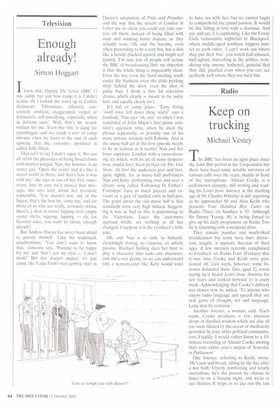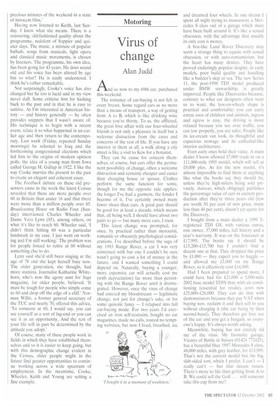Radio
Keep on trucking
Michael Vestey
The BBC has been an agist place since the John Birt period at the Corporation but there have been some notable survivors of various culls over the years, mainly in front of the microphone. Alistair Cooke is a well-known example, still writing and reading his Letter from America at the startling age of 94. Charles Wheeler is still reporting as he approaches 80 and Alan Keith who presents Your Hundred Best Tunes on Radio Three on Sundays is 93. Although Sir Jimmy Young, 80, is being forced to give up his daily programme on Radio Two he is returning with a weekend show.
They remain popular and much-liked broadcasters but some have their detractors, largely, it appears, because of their ages. A few listeners recently complained to Feedback on Radio Four (Fridays) that it was time Cooke and Keith were pensioned off. Last week, however, some listeners defended them. One, aged 32, wrote saying he'd heard Letter from America for ten years and looked forward to it every week. Acknowledging that Cooke's delivery was slower now he added, 'To anyone who enjoys radio language and speech they are real gems of thought, wit and language. Long may he continue,' Another listener, a woman, said, 'Each week, Cooke produces a few precious drops of distilled wisdom which are alas all too soon diluted by the ocean of mediocrity provided by your other political commentators. Frankly. I would rather listen to a 15minute recording of Alistair Cooke snoring than your entire year's output of Yesterday in Parliament.'
One listener, referring to Keith, wrote: 'He's jam and bread, sitting by the fire after a hot bath. Utterly comforting and totally marvellous, he's the person we choose to listen to on a Sunday night, and we're in our thirties. It helps us to eke out the last
precious minutes of the weekend in a state of innocent bliss.'
Having now listened to Keith, last Sunday, I know what she means. There is a reassuring, old-fashioned quality about the programme, redolent of happier and quieter days. The music, a mixture of popular ballads, songs from musicals, light opera and classical music movements, is chosen by listeners. The programme, his own idea, has been going for 43 years. He does sound old and his voice has been altered by age but so what? He is easily understood. I think he's rather remarkable.
Not surprisingly, Cooke's voice has also changed but he too is lucid and in my view never dull. Some criticise him for harking back to the past and in that he is easy to satirise. As I'm interested in American history — and history generally — he often provides snippets that I wasn't aware of. His technique is to begin with a recent event, relate it to what happened in an earlier age and then return to the contemporary. Last week (Friday, repeated Sunday mornings) he referred to Iraq and the forthcoming congressional elections which led him to the origins of modern opinion polls, the idea of a young man from Iowa called George H. Gallup in 1922. I like the way Cooke marries the present to the past to create an elegant and coherent essay.
The Feedback debate on these old presenters came in the week the latest Census revealed that there are more people over 60 in Britain than under 16 and that there were more than a million people over 85. Broadcasting House on Radio Four (Sunday) interviewed Charles Wheeler and Dame Vera Lynn (85), among others, on what it's like to reach 60. Wheeler said, 'I didn't think hitting 60 was a particular landmark in my case. I just went on working and I'm still working.' The problem was for people forced to retire at 60 without something else to do.
Lynn said she'd still been singing at the age of 78 and she kept herself busy now. The older generation, she thought, had more stamina. Journalist Katharine Whitehorn, who's now the agony aunt for Saga magazine, for older people, believed, 'It must be tough for people who simply come to 60 and drop off the edge of a cliff.' Norman Willis, a former general secretary of the TUC and nearly 70, offered this advice, To someone at 60, I would say, you can see yourself as a sort of fag-end or you can see it as an opportunity. And the rest of your life will in part be determined by the attitude you adopt.'
Of course, many of these people work in fields in which they have established themselves and so it is easier to keep going, but with this demographic change evident in the Census, older people might in the future find greater opportunities to continue working across a wide spectrum of employment. In the meantime, Cooke, Wheeler, Keith and Young are setting a fine example.



































































































 Previous page
Previous page